CORRUPTION & FATE
CORRUPTION & FORMS
As Mythenders take on Mythic Power, they gain Corruption—the physical manifestation of that power. This Corruption twists and changes your physical form to become more like the god you’re fated to become, and as it does so, it makes it harder for you to resist the eroding of your mortal soul.
Suffering Corruption
Corruption is tracked each time Mythic power is used. When the rules demand you suffer Corruption, you’ll check more Corruption boxes, as detailed in Suffering Corruption. This happens when you:
- Perform a Badass, Epic Feat and either embrace or fail to resist Corruption
- Terrorize Mortals for Power
- Make a Mythic Action or Titanic Action in battle
- Choose to Survive Death in battle
Healing Corruption
By Seeking Sympathy & Healing, you will heal some of your Corruption.
Corruption & Your Form
As you push more and more Corruption, your physical Form changes. These Forms are linked not only to your body, but to how mortals perceive you as a Mythic being. The more godlike your form, the more unable they are to handle your presence. They may swear undying love to you as you progress, or even die at the sight of you.
These Forms were creating during Damning Your Mythender in character creation.
If you have zero or one Corruption box checked, you appear as you normally do, your Mortal Form.
Once you have two Corruption boxes checked, you appear as your Paragon Form, transforming in that instant.
At four Corruption boxes checked, you appear as your Supernatural Form.
When all six Corruption boxes are checked, you appear as your Godly Form.
These Forms don’t change how you act. You retain all free will so long as you have any mortal soul—that is, up to the point where you become a Myth.

Olivia currently appears as her Paragon Form: a shadow that is in constant battle, even when she is still. If she checks off another box, she’ll change to her Supernatural Form.
Corruption Numbers
The numbers in each Corruption box refers to Risking & Suffering Fate, and indicate how difficult it is to resist losing part of your mortal nature.
When the Mythic die is rolled, that number is compared to your Corruption number. If the die is that number or higher, you cannot resist that small loss of mortality and gain of Mythic power.
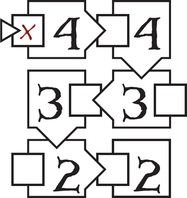
Corruption number 4
Corruption Number Example
Beatrice suffers Corruption for the first time in this adventure, as she describes a Mythic action in battle and takes up the Mythic die. So she checks off the first Corruption box. The number next to that box is 4, so when she’s resolving Risking & Suffering Fate, she’ll compare the Mythic die to her current Corruption number of 4.
The next time she suffers Corruption, her number will still be 4. The third time, it’ll be 3, and so on. If you run out of Corruption boxes to check off, your Corruption number stays at 2.
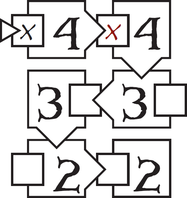
Corruption number 4
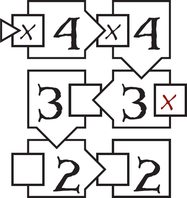
Corruption number 3
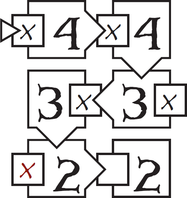
Corruption number 2
SUFFERING CORRUPTION
When you suffer Corruption, you check off Corruption boxes and possibly change your Form.
In Battle, you’ll check off one Corruption box, starting with the box in the top-left and following the arrows down.



Outside of Battle (Badass, Epic Feats and Terrorizing Mortals for Power), you’ll check off two Corruption boxes, which means you’ll definitely change form (see below).
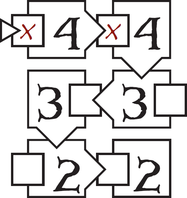
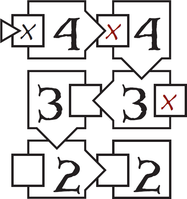
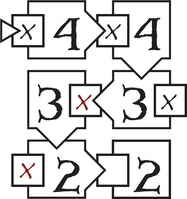
If you have all six boxes checked, your Form is as corrupted as your Mythic Heart can make it—you already appear as a god! If you have five boxes checked and are required to check two more, you’ll only check the sixth box.
When You Suffer & Change
If you checked the second box on a given row, you’ll change form (as per Corruption & Your Form). When this happens, describe how the transformation takes effect.
Forms & Starting Thunder Dice
The Form you are in when you start a battle determines your starting Thunder dice, as that Corruption allows more raw energy to surge through you, to help you survive against gods.
- Mortal Form: 1 Thunder die
- Paragon Form: 2 Thunder dice
- Supernatural Form: 4 Thunder dice
- Godly Form: 6 Thunder dice
HEALING CORRUPTION
When you heal Corruption, you erase checks you’ve made earlier in the adventure. You’ll always heal two boxes. You will heal the most recent boxes first, going up.
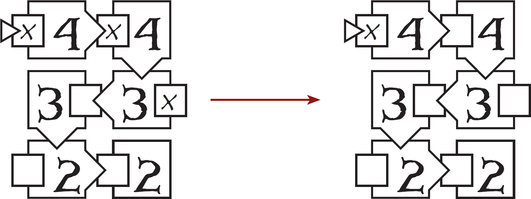
If you have only one box checked, you’ll only heal that one box. If you have no boxes checked, you don’t heal; you don’t need it!
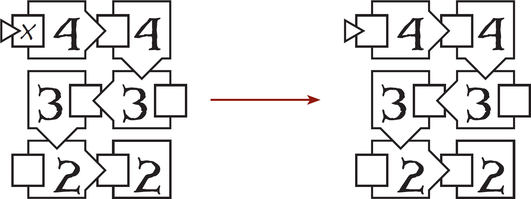
Permanent Corruption
If you have any permanent Corruption boxes (see here), they will never heal.
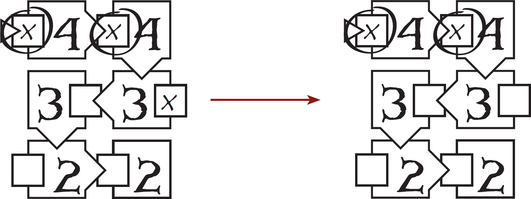
When You Heal
Because you’re unchecking Corruption boxes, your Form reverts back one step: from Godly to Supernatural, Supernatural to Paragon, or Paragon to Mortal. When this happens, describe how the transformation takes effect. (Naturally, there’s no reverting if you were already in your Mortal Form.)
MYTHIC FATE & GIFTS
While Corruption is the physical manifestation of Mythic Power, Fate is the metaphysical scar that power leaves on you. It measures how close you are to becoming the god you’re fated to be.
Risking & Suffering Fate
Fate is tracked when you use Mythic power. In battle, it is risked, meaning that you may or may not suffer Fate. Outside of battle, when you channel Mythic Power, you will definitely suffer Fate.
When the rules demand you suffer Fate, you’ll check more Fate boxes, as detailed in Suffering Fate (here). As with Corruption, this happens when you:
- Perform a Badass, Epic Feat and either embrace or fail to resist Corruption
- Terrorize Mortals for Power
- Make a Mythic Action or Titanic Action in battle
- Choose to Survive Death in battle
Healing Fate
By Seeking Sympathy & Healing, you may choose to heal some of your Fate.
Fate & your Soul
As you check off more Fate boxes, you’re letting the Mythic World have more and more of a handle on your mortal nature. At first, it is resisted easily, but as you lose more, you open yourself up to becoming a Myth.
If taken too far, you will Become a Myth.
Gifts from your Mythic Heart
The upside to losing your mortality? Getting power! With each step down the path to apotheosis, you gain from your Mythic Heart a Gift: a way that, in battle, you are superior to other Mythenders and more of a match for Myths, using their dirty tricks against them.
These Gifts (found in the Your Heart’s Gifts chapter) give you access to new rules that break how battle normally works. The Myths have many of these. You might want some as well.
The First Gift Slot
Your Heart, chosen at Mythender Creation, gives you your first Gift. This is written in the top Gift slot. This Gift will never go away; it is the base power you have as a Mythender.
RISKING & SUFFERING FATE
Whenever you suffer Corruption, you’ll also either risk or suffer your Fate progressing toward your Mythic end.
Before you consult these rules, make sure you’ve already dealt with whatever Corruption you caused due to this action. That will impact how you do things here, if your Corruption number changes.
Risking Fate
When you do a Mythic or Titanic Action in battle (here), you’ll risk suffering your Fate. (See Suffer Corruption & Risk Fate).
In short, if the Mythic Die you rolled is equal to or higher than your Corruption Number (which may have changed based on the Corruption you just took), you must suffer Fate. Otherwise, you have the choice whether you wish to suffer Fate or hold back from it.
Suffering Fate
When you suffer Fate, you’ll check off one or two Fate boxes, depending on which rule is causing you to suffer Fate. (Terrorizing Mortals for Power can cause two boxes to be checked; otherwise, check one box.)
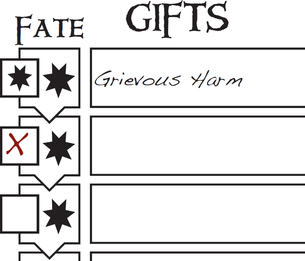
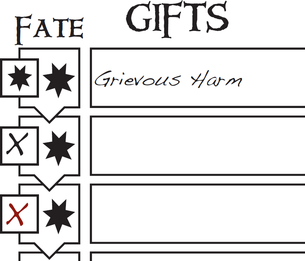
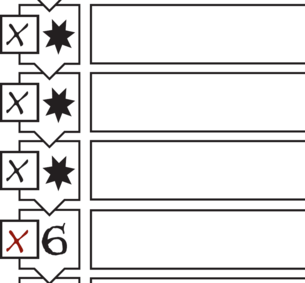
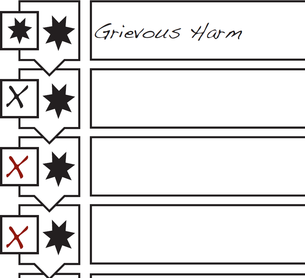
Fate & Apotheosis Number
Some Fate boxes have numbers next to them. These are Apotheosis numbers. When these are checked, at the end of this battle (or the next one, if you checked this outside of battle), you’ll have to deal with possibly becoming a god.
That’s covered in Becoming a Myth.
Gaining Gift Slots
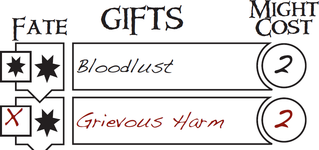
If you checked off any Fate boxes, then you gain Gifts! Each blank Gift slot next to a checked Fate box is available for placing a new Gift. Write the name of the Gift and its Might cost in the boxes to the right of the Fate box.
When you have a Gift Slot open, you may pick a new Gift or upgrade an existing Gift you have. You may take a Gift in this slot at any time, not just right when you acquire the slot. If you choose one right now, you may immediately take benefit from it (if you pay the Might cost) before you Push Forward.
Read the chapter on Gifts (Your Heart’s Gifts) for more information, as well as the list of Gifts and upgrades you may choose from.
If you’re out of Fate boxes
If you cannot check any more Fate boxes, then there is no further benefit or cost to your action. Also, you’re pretty much going to become a god soon, as that means your Apotheosis number is 2. If you’re told to check off two boxes, and you only have one left, you only check that last box off.
HEALING FATE
When you choose to heal Fate, you erase checks you’ve made earlier in the adventure. You’ll erase the check in the most recent Fate box and the Gift written in that slot, if any.

You never have to heal your Fate when you Seek Sympathy & Healing. That’s an option, if you’re willing to give up the Gift on that Fate track.
As with permanent Corruption, you cannot heal permanent Fate.

Healing & Losing Gifts
When you heal a Fate box, you lose the Gift slot linked to it. If you wrote a Gift in that slot, erase it. See Losing Gifts for more details.
Should you suffer Fate later in this adventure, you may choose the same or a different Gift for your newly re-opened Gift slot.
PERMANENT CORRUPTION & FATE
When you die in battle and make the choice to come back to life (see here), you gain permanent Corruption and permanent Fate.
Permanent Corruption and permanent Fate can never be healed away. Once gained, they exist on you until you die or become a god. These permanent boxes are noted with circles around them.
Marking Permanence
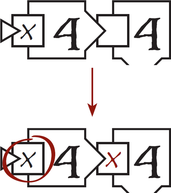
Start marking permanent Corruption and permanent Fate at the top of each track.
If you have not yet gained permanent Corruption and Fate, then circle the mark you made around the top-left Corruption box and the first Fate box. If you already have permanent Corruption and Fate, then you’ll progress to the next respective boxes, just as you do during normal progression.
Unless all of the boxes on a track are already permanent, you should be circling a box. It may be the box you also just checked off.
When Seeking Sympathy & Healing, you cannot heal away permanent Corruption and Fate. Now those will never go away. Nor will they go away once an adventure is complete and you start a new one; you’ll instead start with your current permanent Corruption and Fate.
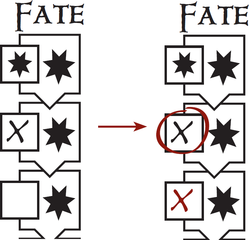
first one marked in play
First Permanent Fate Box
Every Mythender starts with the first the first Fate box permanently checked. It always counts as checked, including for determining many Might tokens are gained from Terrorizing Mortals for Power and Lightning tokens gained from Channeled Hatred Gift (page 164).
BECOMING A MYTH
When a battle is over, if you still live and you have any Fate boxes with an Apotheosis number checked, you will have to see if you become a Myth.
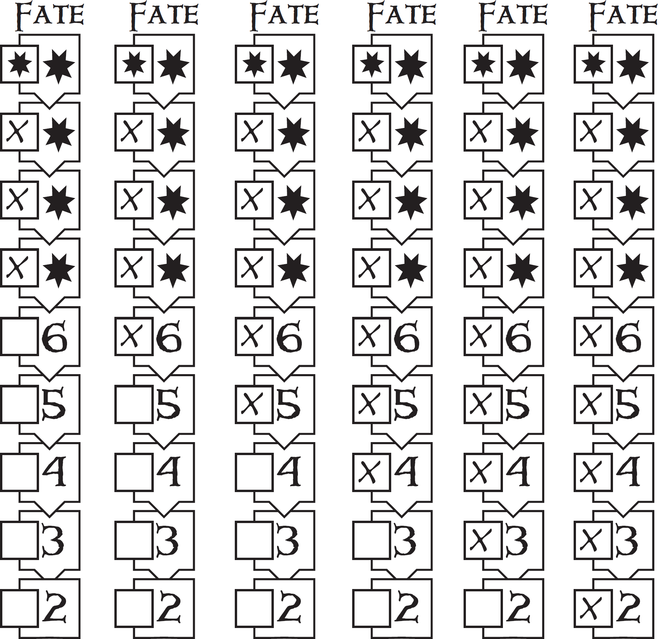
The first example shows a Mythender that is safe from apotheosis. The others show increasing danger of it happening.
Checking for Apotheosis
Roll a die to see if your Mythic Heart has won this internal battle—the Mythic Die is appropriate, but no rules involving the Mythic Die are triggered. If the die is equal to or higher than the Apotheosis number, then you have become a Myth. Welcome!
If not, you are safe…for now.
And if you are safe, you cannot choose to become a Myth. Your Mythic Heart isn’t strong enough to consume you…yet.
What Happens When you Become a Myth
The moment you do, the Mythic World whisks its newborn deity away to save it from the other Mythenders. This cannot be stopped—it would be a really boring story if it did.
You should describe this final transformation and disappearance, and the others should describe their reactions. Feel free to have a few parting words as the last of your mortality is burned away, or a few parting words as the new Myth.
Your Weapons, including Companions, are swept up in the raw power and becomes part of your Myth. Though, you can break this rule to link a new Mythender to an old one: a single Companion may be spared if he or she is to become a new Mythender because of this, or a new Mythender finds one of your fallen Mythender’s Relics.
The Myth You Become
There are two general options for the Myth you become. The obvious is the one linked to in your Fate, but you can also become the new incarnation of the god you just Ended, only more badass because the new model is always better than the old one.
Either way, if you’re going to play again, the Mythmaster should create a new god to use, taking inspiration and direction from the existing write-ups in the Mythic Norden chapter. But don’t do that right away. Savor this moment of story.
Example
Yolen, a simple farmer turned into a Mythender (a Mourner Bearer of Life) has fought well against Thor, Ending him by stabbing him in the face with his heirloom war hammer. In this battle, he suffered Fate and checked off his 5 Fate box.
He rolls the Mythic die, and gets a 5. Yolen is no more!
Yolen’s player, Tyler, decides that Yolen should replace Thor—there should always be a Thor, he says—but one with a God of Life bent to him. That’s enough for now; if they play again, the Mythmaster can create this new Thor.
He describes picking up Thor’s hammer, Mjölnir, and as he does, his heart bursts out of his chest. But instead of blood flowing out, vines crawl and form all over his body, shaping him to be Thor with armor of the forest rather than of metal.
Rashid and Beatrice, his two fellow Mythenders, look on in sadness. Beatrice screams “No!” Yolen just looks back, his eyes echoing the same sadness, the last act of his mortal life.
Then lightning strikes, blinding all for a moment. When their vision regains, Yolen is gone.